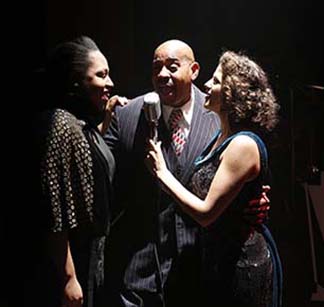Theater
The problem with “The Last Ship,” a recitative musical written by John Logan and Brian Yorkey, with music and lyrics by pop artist Sting, is politics. In a play about workers‘ response to the closing of their shipyard, there really isn‘t any. The play is a feel-good story about workers taking over the shipyard to build one last ship to sail around the world. And then what? How does that challenge or even explain the forces that closed their shipyard?
The story begins when the young man, Gideon Fletcher (Michael Esper), rejects his father‘s wish – symbolically represented by a gift of his work boots – that he follow him as a shipyard worker in Newcastle. Instead, Gideon leaves home and girlfriend, Meg Dawson (Rachel Tucker), to see the world and make his fortune.
Theater
A mix of cruelty and humanity, a bit of voyeurism, and some fascination at an indomitable human spirit are the stuff of Bernard Pomerance‘s play “The Elephant Man,” in a moving revival directed by Scott Ellis.
The play, staged first in 1977 in London, imagines the trials and unusual accomplishments of Joseph Merrick, who lived in Europe in the late 1800s, afflicted by a disease so appalling – misshapen body, face distorted by a fungus that grew massively on his head, skin like an elephant‘s hide – that his unfeeling Belgian mother shipped him to a carnival freak show.
Theater
Here‘s a remake of the classic 1944 play and more famous 1949 movie of three sailors on a weekend pass in New York who leave the ship determined to find romance. Or at least women. The brassy Bernstein music is wonderful, the actors are terrific, with a couple of voices a touch above what you often get on Broadway, and the staging is fine, if unexceptional, but hey, this is New York, where, as Chip says,
“The famous places to visit are so many,
or so the guidebooks say.
I promised daddy I wouldn‘t miss on any,
and we have just one day.
Gotta see the whole town
right from Yonkers on down to the bay…”
Theater

We‘re in a gorgeous Upper East Side apartment with floor to ceiling windows. Amir (Hari Dhillon) is a lawyer and wife Emily (Gretchen Mol) a painter. The first bizarre thing is that she is painting him while he is dressed in a proper business suit above the waist but only boxer shorts below. What is that about? Playwright Ayad Akhtar never makes that clear, and it‘s not the only conundrum.
Cabaret & Jazz, Theater

It‘s 1948, the tenth birthday of Café Society, where great jazz and cabaret in a corner of Greenwich Village clashed with the worst know-nothings of the McCarthy era. But we‘re over that now, so come to this musical memoir to enjoy the delicious sounds of the 30s and 40s. And recall how evil the thought police of that era were. The club became a target of slimy columnists such as Dorothy Kilgallen, who called it a “Moscow-line nightclub.” It was the only place that welcomed whites and blacks, certainly enough to make Mme Kilgallen call it subversive.
Indeed, Barney Josephson was a lefty. So? He put money into integrated housing. He used to joke that the Café was “the wrong place for the right people.” Even Eleanor Roosevelt showed up.
Theater
If only the radical Islamists were just like the people who run the West, capitalists! If you think that‘s the answer, be careful what you wish for. Ayad Akhtar‘s clever, ironic, compelling play shows what could happen when a Wall Streeter, kidnapped for ransom, persuades his captors that he is more valuable to them by showing how to manipulate the West‘s financial system – especially the stock and currency markets.
It‘s presented off Broadway at the New York Theatre Workshop. One wishes it had a broader reach.
Cabaret & Jazz

Between the rock and roll of the sixties and the disco of late seventies stood the golden age of the great singer-song writer. Urban Stages, in its sixth season of December cabaret, this year presented twelve days of performances that ranged from the songs of Stephen Sondheim to a tribune to Big Crosby. The performers were major cabaret artists.
Theater
Based on the real story of the conjoined twins, Daisy and Violet Hilton, who in the 20s and 30s had a glamorous career in vaudeville – even touring with Bob Hope – this fascinating musical is colorful, clever, and funny. It also has some subtle, non-preachy things to say about who is a “freak.”




